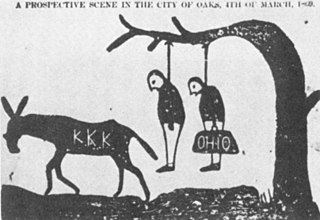
In United States history, scalawag was a pejorative slur referred to white Southerners who supported Reconstruction policies and efforts after the conclusion of the American Civil War.

George Smith Houston was an American Democratic politician who was the 24th Governor of Alabama from 1874 to 1878. He was also a congressman and senator for Alabama.

David P. Lewis was a lawyer and politician who served as the 23rd governor of Alabama from 1872 to 1874 during the Reconstruction era. He was also a Deputy from Alabama to the Provisional Congress of the Confederate States, serving from February until April 1861, when he resigned from office. He was a Unionist. He was the last Republican to serve as Governor of Alabama until H. Guy Hunt was elected in 1986.
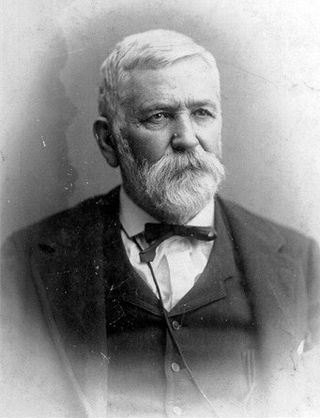
William Hugh Smith was an American planter and politician, the 21st Governor of the U.S. state of Alabama. He was the first Republican elected as governor in the state, serving from 1868 to 1870 during the period of Reconstruction. A former enslaver, he had opposed secession from the United States on the grounds it would imperil slavery. He appeared driven by practical consideration rather than principled opposition to slavery.

Willard Warner was a brevet brigadier general in the Union Army during the American Civil War. He was a U.S. senator from the state of Alabama after the war.

The Alabama Legislature is the legislative branch of the government of the U.S. state of Alabama. It is a bicameral body composed of the House of Representatives and Senate. It is one of the few state legislatures in which members of both chambers serve four-year terms and in which all are elected in the same cycle. The most recent election was on November 8, 2022. The new legislature assumes office immediately following the certification of the election results by the Alabama Secretary of State which occurs within a few days following the election.

The Alabama State House of Representatives is the lower house of the Alabama Legislature, the state legislature of state of Alabama. The House is composed of 105 members representing an equal number of districts, with each constituency containing at least 42,380 citizens. There are no term limits in the House. The House is also one of the five lower houses of state legislatures in the United States that is elected every four years. Other lower houses, including the United States House of Representatives, are elected for a two-year term.

The Alabama State Senate is the upper house of the Alabama Legislature, the state legislature of the U.S. state of Alabama. The body is composed of 35 members representing an equal number of districts across the state, with each district containing at least 127,140 citizens. Similar to the lower house, the Alabama House of Representatives, the senate serves both without term limits and with a four-year term.

The lieutenant governor of Alabama is the president of the Alabama Senate, elected to serve a four-year term. The office was created in 1868, abolished in 1875, and recreated in 1901. According to the current constitution, should the governor be out of the state for more than 20 days, the lieutenant governor becomes acting governor, and if the governor dies, resigns or is removed from office, the lieutenant governor ascends to the governorship. Earlier constitutions said the powers of the governor devolved upon the successor, rather than them necessarily becoming governor, but the official listing includes these as full governors. The governor and lieutenant governor are not elected on the same ticket.
Andrew J. Applegate was a lawyer, officer in the Union Army during the American Civil War, and served as the first Lieutenant Governor of Alabama during Reconstruction. A Republican, Applegate served with Governor William H. Smith of the same political party, from 1868 to 1870.
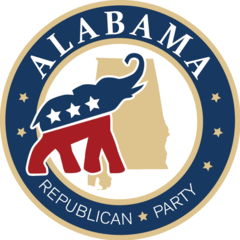
The Alabama Republican Party is the state affiliate of the Republican Party in Alabama. It is the dominant political party in Alabama. The state party is governed by the Alabama Republican Executive Committee. The committee usually meets twice a year. As of the February 23, 2019 meeting in Birmingham, the committee is composed of 463 members. Most of the committee's members are elected in district elections across Alabama. The district members are elected in the Republican Primary once every four years, with the most recent election for the committee having been on June 5, 2018. The new committee takes office following the general election in November 2018. In addition, all 67 county GOP chairmen have automatic seats as voting members. The state chairman can appoint 10 members. Each county committee can appoint bonus members based on a formula that theoretically could add 312 seats, although that formula currently calls for only about 50 seats.

The 1912 United States presidential election in California took place on November 5, 1912, as part of the 1912 United States presidential election. State voters chose 13 representatives, or electors, to the Electoral College, who voted for president and vice president.
The secretary of state of Alabama is one of the constitutional officers of the U.S. state of Alabama. The office actually predates the statehood of Alabama, dating back to the Alabama Territory. From 1819 to 1901, the secretary of state served a two-year term until the State Constitution was changed to set the term to four years. Up until 1868 the secretary of state was elected by the Alabama Legislature, but is now popularly elected. The terms and over 1,000 duties of the office are defined by Sections 114, 118, 132, and 134 of the Alabama Constitution and throughout the Code of Alabama.
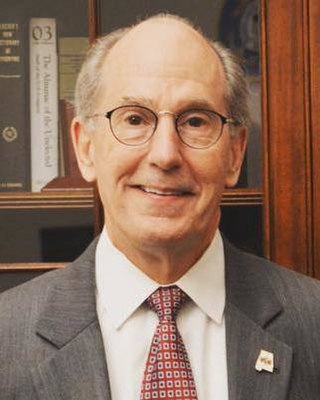
The Alabama state treasurer acts as the head banker for the State of Alabama, handling deposits, withdrawals, redemptions of state warrants and investments of state funds. The position was created in 1819 when Alabama became a state. Its constitution established the Office of the Treasurer of State, a position to be elected by the legislature. Individuals serving as state treasurer were elected annually by the General Assembly from 1819 to 1861. Beginning in 1861, the treasurer was elected biennially from until 1868 and was elected by popular vote for a term of two years in 1868. Arthur Bingham's election in 1868 marked the first time a Republican would hold the office. Kay Ivey in 2002 became the second Republican to hold the office. The treasurer began to be elected to a four-year term as a result of the 1901 Constitution but could not serve successive terms until a 1968 amendment. In 1950, Sibyl Pool (D) would become the first of seven different women to be elected state treasurer.

The 1902 Alabama gubernatorial election took place on November 2, 1902, in order to elect the governor of Alabama. It was the first Alabama gubernatorial election in which the governor was elected for a four-year term; prior to 1902 the governor was elected to a two-year term. Incumbent Democrat William D. Jelks was running for election to his first full term; he had succeeded William J. Samford upon Samford's death a year prior. His Republican opponent, John A. W. Smith, was the son of former Alabama governor William Hugh Smith.
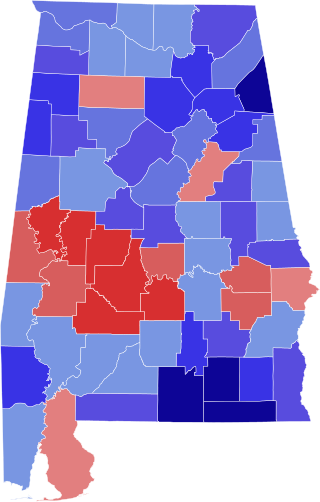
The 1874 Alabama gubernatorial election took place on November 3, 1874, in order to elect the governor of Alabama. Incumbent Republican David P. Lewis unsuccessfully ran for reelection, losing to Democratic former U.S. Representative George S. Houston. This election would end an era of serious competition between the local Democratic and Republican parties, and start a 112-year win streak for Democrats in the gubernatorial level.

The 1870 Alabama gubernatorial election took place on November 8, 1870, in order to elect the governor of Alabama. Incumbent Republican William Hugh Smith was narrowly defeated by Democrat Robert B. Lindsay.

The 1896 United States presidential election in Alabama took place on November 3, 1896. All contemporary 45 states were part of the 1896 United States presidential election. Alabama voters chose eleven electors to the Electoral College, which selected the president and vice president.

The 1868 United States presidential election in Alabama took place on November 3, 1868, as part of the 1868 presidential election. Alabama voters chose eight representatives, or electors, to the Electoral College, who voted for president and vice president.

















